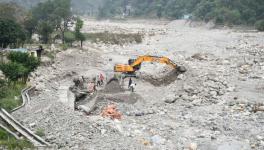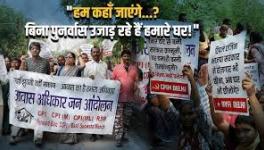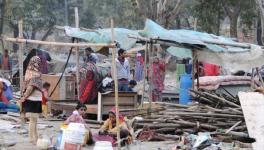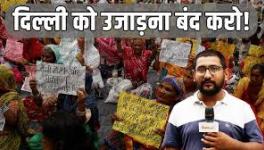Citizens of Nowhere Living in Kashmir
In 2010, the Jammu and Kashmir government led by the former chief minister and vice president of National Conference Omar Abdullah announced that all the Kashmiri surrendered militants who are in Pakistan can return to the valley. They returned to the valley, most of them with their wives from Pakistan. These women, numbering to around 380, are now living a caged life in Kashmir.
Safina Bibi, a 40-year-old woman was married to Bashir Ahmad Bukhari. Bashir had crossed the border to the other side of Kashmir, also known as Pakistan Administrated Kashmir (PAK) for arms training in 1989. At that time, the armed resistance movement in Kashmir was in its infancy and thousands of Kashmiris had crossed the border to get trained.
He was affiliated to the Jammu and Kashmir Liberation Front (JKLF) and was asked by his commanders to stay back in Pakistan and work in the JKLF headquarters in PAK. He worked in JKLF for a decade and finally decided to get married to live a normal life.
In 1999, Bashir started living in Moori Muzaffarabad, the capital of Pakistan Administered Kashmir and worked as a driver. The same year, Bashir was introduced to Safina Bibi and her family. He married her soon.
Also Read: A Tale of Devastation, Betrayal, Revenge and Self-destruction
The couple then shifted to a rented accommodation and later Safina’s family gave a piece of land to Bashir where they built a small house. Eventually, with his small savings he started a small business of tours and travels, and bought cabs.
“My husband was very hard working. His savings helped us buy another house and our life was comfortable and we were living happily,” said Safina. The couple had five daughters and one son.
Bashir would be glued to the television whenever something related to Kashmir flashed on the screen. He would discuss with Safina about his life in Kashmir, and talk to her about the possibility of returning, she said.
In 2010, the government led by Omar Abdullah announced a rehabilitation scheme for surrendered militants who were in different parts of Pakistan and in PAK as well. On February 7, 2010, at a Conference on Internal Security chaired by former Prime Minister Manmohan Singh, Omar Abdullah proposed the scheme which he said was to “encourage surrendered militants to return to the State and manage their transition to civilian life, a new surrender and rehabilitation policy of militants is under active consideration by my government.”
As per the policy, returned militants would get government jobs and their families were promised all the legal documents with which they could travel to their families in Pakistan, but nothing as such happened.
In 2012, Bashir wanted to come back to Kashmir and live the rest of their life in the valley. Initially, Safina didn’t agree to him. “However, he would tell me that we will travel to Pakistan every six months,” she said.
Safina recalled Bashir’s helplessness when he came to know about his father’s death, he had tried to come to Kashmir to attend his last rites. But due to his affiliation with militancy, authorities in the Indian embassy didn’t allow him. Within a span of two months, he lost his mother as well but he couldn’t go due to the same reason.
Finally, in June 2012, Safina agreed to return after she heard that his family including his brothers and sisters are insisting on his return. “We sold our two houses and cars, and decided to return,” she said.
As per the policy, they were supposed to submit their documents at the Indian embassy in Nepal and withdraw their Pakistani citizenship.
After finishing all the formalities, the couple along with their six children took the train route from Nepal to reach India. Safina recalls how Bashir broke into tears on reaching Jammu and boarded the cab to Kashmir. Travelling through Pir Panjal ranges, Bashir described the places from his memory to his family. However, they were arrested for interrogation from Srinagar.
Also Read: Under Modi, a Deep Distrust for Indian Democracy Has Crept Into Kashmir
The police released them after two days of interrogation. They then started their journey to Bashir’s homeland Kreeri, in North Kashmir’s Baramulla district.
In the beginning, Bashir and his family were living with his brothers, however, when he sought his share from his patrimony, he was forced to move out.
“We spent five days on the footpath, we didn’t have anything to eat or to cover our body, but my husband didn’t lose hope,” said Safina.
With the amount he had fetched from the sale of his property in Pakistan, he bought a piece of land and started constructing a house, but there was no end to their problems.
Bashir was unable to get admission for his children in any school as they didn’t have any documents. He rented a house near the construction site. He also bought a cab and started driving again. “We were living the life of refugees,” his wife said.
Once living a luxurious life, Bashir’s children were forced to live in extreme conditions.
On July 18, 2013, after finishing his morning prayers, Bashir left home to buy groceries. He reached the Kreeri bus stand and called his brothers. According to an eyewitness, Bashir sprayed kerosene on his body in front of his brothers and other drives and set himself on fire. Meanwhile, Safina kept waiting for her husband in their semi constructed house.
“His brothers watched him as he set himself ablaze, no one even tried to stop him,” she said.
Bashir was taken to the Sheri Kashmir Institute of Medical Science (SKIMS). His body had received 85 per cent burns, and he succumbed to his injuries in the Intensive Care Unit (ICU) on July 23, 2013.
To perform Bashir’s last rites, his son Faizan Ahmad Bukhari, now 22, borrowed money as they were broke.
After Bashir’s death, Faizan tried his best to get their passports and other documents, but the officials shut the door on his face saying, “Koi tumhe zabardasti yahan nahi le aaya (No one forced you to come here).
“I have spent more than Rs 20,000 to prepare passport for my mother and sisters but I always return with nothing. We want to go back, but we are compelled to be in Kashmir,” he said.
Also Read: The Kashmir Question: A ‘Made in India’ Problem
With no sight of the rehabilitation policy, the only hope left with the family was to return to Pakistan, but even that option is not available to them now.
In Pakistan, Kashmiri migrants are getting money from the government as rehabilitation to manage their expenses and the government sponsors the education of their children. “We used to get at least Rs 30,000 monthly when we were there. But now, we don’t know that even when we die, if anyone will give us a piece of land for our burial,” Faizan said.
Safina’s story is just one among at least 380 women, who are waiting to return to their homeland, but their return has become a distant dream.
Get the latest reports & analysis with people's perspective on Protests, movements & deep analytical videos, discussions of the current affairs in your Telegram app. Subscribe to NewsClick's Telegram channel & get Real-Time updates on stories, as they get published on our website.
























